Balance & Core Training: Strength Starts from the Center
At Healfy, we believe that real strength isn’t just about big muscles—it’s about control, stability, and movement from the inside out. That’s where balance and core training come in. These often-neglected areas are crucial for building a strong, stable body that performs well in both everyday life and workouts.
What Is Balance & Core Training?
Balance Training focuses on stability—your body’s ability to stay upright and in control, whether you’re still or moving.
Core Training targets the muscles of your abdomen, lower back, hips, and pelvis—your body’s center of power.
Together, they support your posture, protect your spine, and help you move better, faster, and safer.
Why Balance & Core Training Matters
Prevent Injuries
A strong core stabilizes your spine and improves your balance, reducing your risk of falls or strains.Improve Posture
Core training corrects muscular imbalances and helps you stand and sit with proper alignment.Enhance Athletic Performance
Whether you run, lift, or play sports, balance and core strength improve power and coordination.Support Daily Activities
From walking on uneven surfaces to lifting groceries, core strength makes everyday movements easier.Promote Longevity
Good balance is key to aging gracefully—maintaining independence and reducing fall risk.
Top Balance & Core Exercises You Can Start Today
You don’t need fancy equipment—just a little space and consistency.
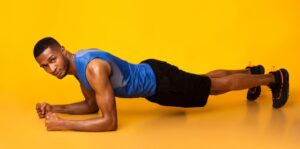 1. Plank (30–60 seconds)
1. Plank (30–60 seconds)
Build total core strength. Keep your body in a straight line from head to heels.
Benefits of Doing Planks
> Strengthens Your Core
Planks target your entire core—including your abs, obliques, and lower back—helping you build a solid foundation for strength and stability.
> Improves Posture
By activating the muscles that support your spine and shoulders, planks help you stand taller and reduce slouching.
> Reduces Back Pain
A strong core takes pressure off your lower back. Regular planks can reduce strain and prevent future back issues.
> Enhances Balance & Stability
Since planks train your body to hold steady, they improve your overall balance and coordination, especially during other exercises or daily movements.
> Boosts Flexibility
Planks gently stretch your shoulders, hamstrings, and arches of your feet, improving mobility over time.
> Activates Multiple Muscle Groups
Planks work more than just your core—they also engage your shoulders, chest, arms, glutes, and legs, making it a full-body workout.
> Improves Athletic Performance
A strong, stable core helps you run faster, lift heavier, and move more efficiently in sports and training.
> Can Be Done Anywhere
No equipment? No problem. Planks require zero gear and minimal space—perfect for home or travel workouts.
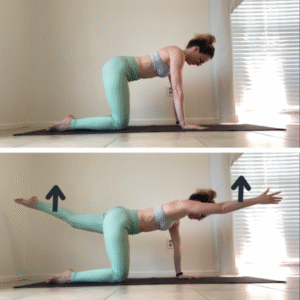 2. Bird-Dog
2. Bird-Dog
Great for stability and coordination. Alternate extending opposite arm and leg.
Benefits of the Bird-Dog Exercise
> Strengthens the Core
Bird-Dog targets the deep core muscles, including the lower back and abdominals, helping you build strength and stability from your center.
> Improves Balance and Coordination
Because it challenges you to move opposite limbs while keeping your torso steady, Bird-Dog enhances neuromuscular coordination and body awareness.
> Supports Spinal Health
This low-impact move engages and strengthens the muscles around your spine, promoting better posture and helping to prevent back pain.
> Enhances Stability
Bird-Dog builds core and pelvic stability, which improves your ability to move efficiently and maintain control during other exercises or daily tasks.
> Promotes Functional Movement
It mimics natural movement patterns (like walking or running), making it excellent for improving functional fitness and overall body mechanics.
> Low-Impact and Safe
It’s joint-friendly and suitable for all fitness levels—including beginners and those recovering from injury.
> Improves Focus and Mind-Body Connection
Holding your balance and coordinating opposite limbs requires mental focus, improving concentration and control.
> Can Be Done Anywhere
No gym needed—Bird-Dog only requires a small space and your own body weight.
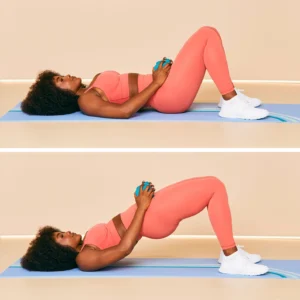 3. Glute Bridge
3. Glute Bridge
Strengthens your lower back, hips, and core.
Benefits of the Glute Bridge Exercise
> Strengthens Glutes and Hamstrings
Glute bridges primarily target your gluteus maximus and hamstrings, helping to build a stronger, more toned backside.
> Reduces Lower Back Pain
By strengthening your glutes and core, this exercise helps support the lower back and relieve pressure on the spine.
> Improves Hip Mobility
The glute bridge stretches the hip flexors and activates the hip extensors, promoting better range of motion and flexibility in your hips.
> Enhances Core Stability
Engaging your core and lower back muscles during the movement helps build stability and balance for everyday activities.
> Supports Better Posture
Stronger glutes and a more stable pelvis contribute to improved posture and reduce slouching or pelvic tilt.
> Boosts Athletic Performance
Powerful glutes are essential for running, jumping, lifting, and other explosive movements. This exercise builds the strength foundation you need.
> Helps Prevent Injury
Weak glutes can lead to compensation patterns that strain the knees and lower back. Glute bridges help correct muscle imbalances and reduce injury risk.
> Accessible for All Fitness Levels
The glute bridge is a low-impact, bodyweight movement that’s great for beginners and can be progressed with resistance bands or weights.
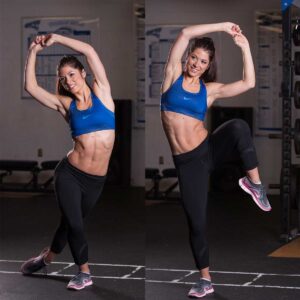 4. Standing Leg Lifts
4. Standing Leg Lifts
Challenge your balance and strengthen your lower body.
Benefits of Standing Leg Lifts
> Strengthens Lower Body Muscles
This exercise targets your hip flexors, glutes, quads, and outer thighs, helping tone and strengthen your legs and hips.
> Improves Balance and Stability
Because you’re standing on one leg, this move trains your body to stay balanced and steady, improving coordination and posture.
> Engages Core Muscles
Keeping your torso stable during leg lifts activates your core muscles, helping to build stability and improve control.
> Enhances Hip Mobility and Flexibility
Leg lifts work through a full range of motion at the hip joint, helping improve hip function and reduce stiffness.
> Boosts Joint Health
This low-impact movement strengthens the muscles that support your knees and hips, reducing stress on the joints and lowering injury risk.
> Supports Everyday Functional Movement
Strong, mobile hips make daily activities like walking, climbing stairs, and standing from a seated position easier and more efficient.
> Easy and Equipment-Free
You can do standing leg lifts anywhere, anytime—perfect for home workouts, travel, or short breaks at work.
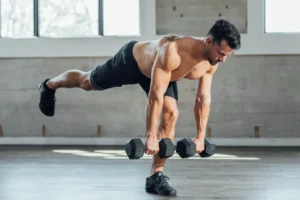 5. Single-Leg Deadlift (Bodyweight or Light Dumbbells)
5. Single-Leg Deadlift (Bodyweight or Light Dumbbells)
Improves balance, coordination, and posterior chain strength.
Benefits of Single-Leg Deadlift (Bodyweight or Light Dumbbells)
> Builds Balance and Coordination
This exercise challenges your stability and proprioception, helping you develop better balance and body control.
> Strengthens Posterior Chain Muscles
It targets the glutes, hamstrings, and lower back—key muscles that support posture, hip strength, and athletic movement.
> Improves Core Stability
Staying upright on one leg requires core engagement, helping strengthen your abs and lower back for overall stability.
> Enhances Functional Movement
Single-leg deadlifts mimic real-life motions like bending and lifting, training your body for safer, more efficient daily movements.
> Fixes Muscle Imbalances
By working one leg at a time, this exercise helps correct strength differences between your left and right side.
> Protects Lower Back and Knees
When performed with proper form, this movement reinforces the muscles around the hips and core, reducing pressure on the knees and spine.
> Improves Hip Hinge Mechanics
It teaches proper hip movement, which is essential for lifting, bending, and athletic performance without injury.
> Great for All Fitness Levels
You can start with just your bodyweight and gradually add light dumbbells, making it ideal for both beginners and advanced fitness routines.
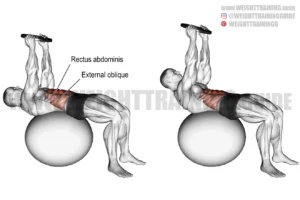 6. Stability Ball Crunches
6. Stability Ball Crunches
Engages your abdominal muscles more deeply than floor crunches.
Benefits of Stability Ball Crunches
> Engages Core Muscles More Deeply
The unstable surface of the ball forces your abs, obliques, and lower back to work harder compared to floor crunches.
> Improves Balance and Coordination
Balancing on the ball activates stabilizing muscles and improves your overall coordination and body control.
> Supports Proper Spinal Alignment
The ball allows for a full range of motion and supports the natural curve of your spine, reducing strain on your neck and back.
> Enhances Posture
Stronger core muscles help improve posture, making it easier to sit and stand with correct alignment throughout the day.
> Reduces Risk of Injury
By strengthening your core and promoting better movement patterns, stability ball crunches can help protect your back and prevent injury.
> Builds Functional Strength
A stronger core supports your performance in daily activities and exercises like lifting, twisting, and bending.
> Versatile and Low Impact
Stability ball crunches are gentle on joints and suitable for various fitness levels, from beginners to advanced users.
> Adds Variety to Your Routine
Using a stability ball keeps your core workouts fresh, challenging, and effective.
Simple Weekly Plan
Day Focus
Monday Planks + Bird-Dog
Wednesday Glute Bridges + Standing Leg Lifts
Friday Stability Ball Crunches + Single-Leg Deadlifts
Daily 2–3 minutes posture check and balance practice (e.g., stand on one leg)
Final Thought
Balance and core training might not look flashy, but they lay the foundation for everything you do. Start small. Be consistent. And over time, you’ll notice yourself moving stronger, standing taller, and feeling more confident in your body.
At Healfy, we’re here to help you build a body that’s strong from the center out—stable, agile, and ready for whatever life throws your way.
